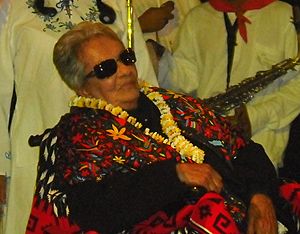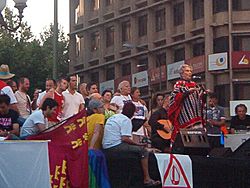Chavela Vargas facts for kids
Quick facts for kids
Excelentísima Señora
Chavela Vargas
|
|
|---|---|

Chavela Vargas in 2009
|
|
| Born |
Isabel Vargas Lizano
17 April 1919 San Joaquín de Flores, Heredia Province, Costa Rica
|
| Died | 5 August 2012 (aged 93) Cuernavaca, Morelos, Mexico
|
| Occupation |
|
| Years active | 1961– 2012 |
| Musical career | |
| Genres | |
| Instruments |
|
| Labels | RCA Mexicana |
| Associated acts | José Alfredo Jiménez |
Isabel “Chavela” Vargas Lizano (Spanish pronunciation: [tʃaˈβela ˈβaɾɣas]; 17 April 1919 – 5 August 2012) was a Costa Rican-born Mexican singer. She was especially known for her rendition of Mexican rancheras, but she is also recognized for her contribution to other genres of popular Latin American music. She was an influential interpreter in the Americas and Europe, muse to figures such as Pedro Almodóvar, hailed for her haunting performances, and called "la voz áspera de la ternura", 'the rough voice of tenderness'. She received the Lifetime Achievement Award at the 8th Annual Latin Grammy Awards.
Contents
Early life and career
She was born in Costa Rica, in San Joaquín de Flores, as Isabel Vargas Lizano, daughter of Francisco Vargas and Herminia Lizano. She was baptized on 15 July 1919 with the forenames "María Isabel Anita Carmen de Jesús." She had a difficult childhood: her parents divorced and left her under the care of an uncle, and she contracted poliomyelitis. She went by Chavela, which is a pet name for Isabel. At age 17, she abandoned her native country due to lack of opportunities for a musical career, seeking refuge in Mexico, where an entertainment industry was burgeoning. There she resided for more than seventy years and obtained Mexican nationality.
For many years she sang on the streets, but in her thirties she became a professional singer. She was known for her characteristic red jorongo, which she wore in performances until old age. Vargas was radical in her negation of heteronormativity. Since she preferred to dress like a man, Vargas’ parents hid their defiantly nonfeminine daughter from guests.
Vargas sang the canción ranchera in her own peculiar style. The ranchera was sung from a man's perspective and with a mariachi accompaniment. Chavela sang this type of song as a solo, using only guitar and voice. She often slowed down the tempo of melodies to draw more dramatic tension out of songs, so they could be taken as naughtily humorous.
Towards the end of the 1950s, she became known within artistic circles, due in part to her performances in Acapulco, center of international tourism, where she sang at the Champagne Room of the restaurant La Perla. Her first album, Noche de Bohemia (Bohemian Night), was released in 1961 with the professional support of José Alfredo Jiménez, one of the foremost singer/songwriters of Mexican ranchera music. She eventually recorded more than 80 albums. Vargas was hugely successful during the 1950s, the 1960s, and the first half of the 1970s, touring in Mexico, the United States, France, and Spain and was close to many prominent artists and intellectuals of the time, including Juan Rulfo, Agustín Lara, Frida Kahlo and her husband, Diego Rivera, Dolores Olmedo and Jiménez. Although her lyrics were addressed to women, Vargas did not publicly come out until the age of 81 in her 2002 autobiography And If You Want to Know about My Past (Y si quieres saber de mi pasado).
Partial retirement and return to the stage
Vargas retired from performing and returned to the stage in 1991, performing at a bohemian nightclub called "El Hábito" in Coyoacán, Mexico City. Her career started to recover international prominence, with performances in Latin America, Europe and the United States. Vargas debuted at Carnegie Hall in 2003 at age 83 at the behest and promotion of Spanish director Pedro Almodóvar, an admirer and friend.
Appearances in film
Vargas is featured in many of Almodóvar's films, including La flor de mi secreto in both song and video. She said, however, that acting was not her ambition, although she had previously participated in films such as the 1967 movie La Soldadera. Vargas also appeared in Frida, singing "La Llorona" ("The Weeping Woman"). Her classic "Paloma Negra" ("Black Dove") was also included in the soundtrack of the film. She appeared in Alejandro González Iñárritu's Babel, singing "Tú me acostumbraste" ("I got used to you"), a bolero by Frank Domínguez.
On 10 February 2017, the biographical film Chavela debuted. Directed by Catherine Gund and Daresha Kyi, the film features Pedro Almodóvar, Elena Benarroch and Miguel Bosé among others.
Death and legacy
Chavela Vargas had been hospitalized for several weeks as a result of respiratory problems. She died in Cuernavaca, Mexico. According her official Facebook page, her last words were "I leave with Mexico in my heart."
On August 6th 2012, Chavela’s funeral was held in Plaza Garibaldi in the center of Mexico city. The film Chavela included footage of her funeral. Hundreds of fans and loved ones gathered in order to honor her legacy where they played her music and drank her favorite drink, tequila. Chavela's ashes were scattered in Chalchi Hills, Morelos, Mexico.
The film Chavela mentions that after her new found popularity in Spain, she no longer rejected the word “lesbian” despite having previously been offended by the term. In the film, Chavela states that there is no longer a need to be scared about defining herself as a lesbian, and embraced being open about who you are. In the film, one of the last statements she makes is that “My song is dedicated to all the women of the world: Mothers, daughters, sisters, wives, friends, and lovers.”
A slogan that she lived by and would often tell her fans was “Human beings love, and that’s all that matters. Don’t ask them who they love or why.” She had categorized the person she was before leaving for Mexico as Isabella, someone that she held dear. Whereas ‘Chavela’ was born in 1942 when she moved to Mexico and was someone who was “Cabrona.” In the persona of Chavela, she found a safety net for herself that allowed her to continue living despite the turmoil she had faced. In one of her last interviews in the film, she states, “When you’re true to yourself, you win in the end.”
On 17 April 2013, Google celebrated her 94th birthday with a Google Doodle.
In August 2019, Vargas was one of the honorees inducted in the Rainbow Honor Walk, a walk of fame in San Francisco's Castro neighborhood noting LGBTQ people who have "made significant contributions in their fields."
Selected discography
- Con el cuarteto Lara Foster, 1961
- Hacia la vida, 1966
- Corridos de la revolución, 1970
- Amanecí en tus brazos, 1973
- La Original, 1973
- Lamento Borincano, 1973
- Poema 20, 1975
- Noche Bohemia, 1989
- Noche de Ronda, 1989
- Piensa en mí AKA Vuelve, 1991
- Boleros, 1991
- La Llorona, 1994
- Sentimiento de México (vol. 1), 1995
- De México y del Mundo, 1995
- Le canta a México, 1995
- Volver, volver, 1996
- Dos, 1996
- Grandes mementos, 1996
- Macorina, 1994/1996
- Chavela Vargas, 1997
- Pasión bolero, 1999
- Colección de oro, 1999
- Con la rondalla del amor de Saltillo, 2000
- Para perder la cabeza, 2000
- Las 15 grandes de Chavela Vargas, 2000
- Grandes éxitos, 2002
- Para toda la vida, 2002
- Discografía básica, 2002
- Antología, 2004
- Somos, 2004
- En Carnegie Hall, 2004
- La Llorona, 2004
- Cupaima, 2006/2007
- Soledad, 2007
- Piensa en mí, on Splendor in the Grass by Pink Martini, 2009
- Luz de Luna, on San Patricio by The Chieftains featuring Ry Cooder, 2010
- Por mi culpa!, 2010
- Luna Grande, 2012
See also
 In Spanish: Chavela Vargas para niños
In Spanish: Chavela Vargas para niños
- Ranchera
- Cuco Sanchez
- List of people from Morelos, Mexico


